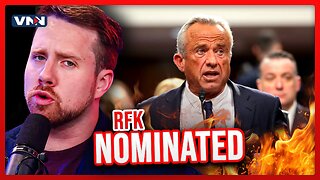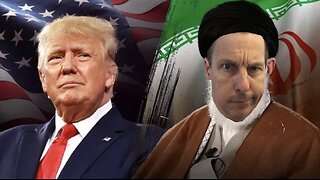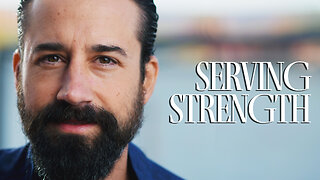Premium Only Content

Episode 1698: Speaking Truth to Power
The American Friends Service Committee: The Quaker organization published a pamphlet titled "Speak Truth to Power: a Quaker Search for an Alternative to Violence" in 1955.
We hear that phrase used a lot by more of the radical elements today because the will use violence to get what they want and refer it to Power. They also equate Truth to non-truth usually.
During Advent do we as Catholics speak truth to power as Christ taught? In otherwards Christs Truth to both the secular and church powers that don’t want this truth to be proclaimed?
We know Jesus fearlessly challenged religious and political authorities of his time, speaking out against hypocrisy and advocating for the marginalized. His teachings on turning the other cheek and loving one's enemies don't equate to meek silence in the face of oppression.
The Prophets: Throughout the Old Testament, prophets like Amos, Isaiah, and Jeremiah served as God's mouthpieces, criticizing the powerful for their corruption and urging them to follow righteous paths.
The Apostles: In the Book of Acts, we see apostles like Peter and Paul boldly proclaiming the gospel even when facing persecution and imprisonment.
Early Christian writers: St. Augustine's concept of "just war" challenged the absolute authority of rulers, arguing that sometimes speaking truth requires resistance against unjust power.
Saint Athanasius: In the 4th century, Athanasius fiercely defended the divinity of Jesus against powerful opposition from the Roman Emperor Constantine and Arian bishops. He endured exile and persecution but never backed down from proclaiming his beliefs.
2. Saint Joan of Arc: A teenage peasant girl, Joan challenged the authority of the English crown and the corrupt French clergy, leading her people to victory in battle. Though eventually burned at the stake for heresy, she remains a powerful symbol of speaking truth to power, even in the face of death.
3. Saint Francis of Assisi: Known for his love of nature and humility, Francis also challenged the materialism and corruption of the church in his time. He lived simply, preached to the poor, and criticized the clergy for focusing on wealth and power over spiritual service.
4. Saint Thomas More: A close advisor to King Henry VIII, Thomas More refused to swear allegiance to the king as the Supreme Head of the Church of England, which he believed contradicted his Catholic faith. He was beheaded for his convictions, highlighting the courage required to speak truth to power, even when it means personal sacrifice.
5. Saint Damien of Molokai: Father Damien devoted his life to caring for lepers who were ostracized and neglected by Hawaiian society. His work challenged societal prejudices and forced the government to provide better care for those suffering from the disease.
6. Mother Teresa: Mother Teresa dedicated her life to serving the poorest of the poor in Calcutta, India. She criticized governments and authorities for failing to address poverty and human suffering, urging them to recognize the inherent dignity of each person.
7. Archbishop Oscar Romero: During the brutal Salvadoran Civil War, Archbishop Romero used his pulpit to denounce human rights abuses by the government and military. He became a voice for the voiceless, challenging the powerful to end the violence and oppression.
Advent, a time of reflection and preparation for the coming of Christ, offers a powerful opportunity for traditional Catholics to embody the spirit of "speaking truth to power." However, the way we express this "speaking" can take many forms, reflecting the multifaceted nature of our faith and the complexities of the world around us. Here are some ways to consider:
Through Prayer and Action:
Intentional Prayers: During your individual and communal prayers, lift up concerns about societal injustices, corruption, and the needs of marginalized communities. Pray for the courage and wisdom to address these issues in a Christ-like manner.
Charitable Works: Advent is a season of generosity. Partner with Catholic charities or local organizations working on issues you care about, whether it's feeding the hungry, advocating for social justice, or supporting environmental causes. Action speaks louder than words, and your deeds can be a powerful way to challenge the status quo.
Through Witness and Dialogue:
Faithful Communication: Engage in respectful and open dialogue with individuals and communities outside your own circle. Share your faith perspective on societal issues while actively listening to others' viewpoints. Remember, true dialogue involves not just speaking, but also listening and learning.
Living by Example: In your daily life, strive to embody the values you believe in. This might involve acts of kindness, standing up for what's right even when it's difficult, or simply living a life of integrity and compassion. Your personal example can be a powerful testament to your faith and a gentle challenge to those around you.
Through Community and Action:
Seek Guidance: Approach your pastor or spiritual advisors for guidance on how to address specific concerns or navigate sensitive topics. Their wisdom and experience can help you find ways to "speak truth to power" in a way that aligns with Catholic teachings and promotes constructive change.
Empowerment through Community: Join with other like-minded Catholics in community initiatives focused on social justice, environmental stewardship, or other pressing issues. Collective action can amplify your voice and create a lasting impact.
Remember, "speaking truth to power" during Advent is not about shouting accusations or demanding immediate change. It's about embodying the spirit of Christ's message: love, justice, compassion, and hope. By living our faith authentically, engaging in respectful dialogue, and acting with intention, we can contribute to a more just and equitable world, one step at a time.
-

Graham Allen
3 hours agoDems Try To RAID USAID Office!! + Trump Meets With Netanyahu In The Oval Office! Peace Is HERE!!
40.2K29 -
 LIVE
LIVE
Randi Hipper
57 minutes agoGROUNDBREAKING CRYPTO BILL INTRODUCED! WHAT THIS MEANS FOR BITCOIN INVESTORS
369 watching -
 LIVE
LIVE
Vigilant News Network
15 hours agoRFK Jr. Clears Major Hurdle for HHS Secretary | The Daily Dose
1,228 watching -
 1:28:24
1:28:24
Game On!
15 hours ago $0.61 earnedTom Brady's SHOCKING Super Bowl Pick!
30.9K1 -
 1:12:24
1:12:24
Jeff Ahern
2 hours ago $0.08 earnedNever Woke Wednesday with Jeff Ahern (6am Pacific)
41.4K4 -
 18:52
18:52
Producer Michael
18 hours agoI GOT PULLED OVER BY THE POLICE IN MIAMI!
76.6K6 -
 1:21:53
1:21:53
MTNTOUGH Fitness Lab
23 hours agoThe Fight That Almost Destroyed Jim Miller (& How He Overcame It) to Break UFC Records
72.2K4 -
 24:46
24:46
Cooking with Gruel
1 day agoFeeding Hope - LA Wildfire Relief from the People
49.4K8 -
 14:34
14:34
MichaelBisping
15 hours agoSean Strickland CONFRONTS Bisping! 'Pereira in Corner, Dricus and Khamzat!' (EXCLUSIVE INTERVIEW)
29.4K4 -
 59:54
59:54
Trumpet Daily
23 hours ago $3.63 earnedThe Trade War Ends - Trumpet Daily | Feb. 4, 2025
27.2K26